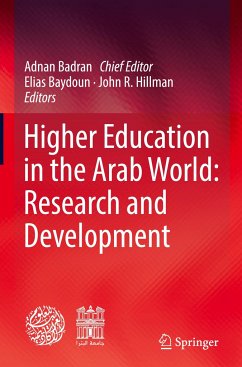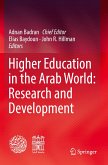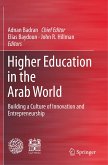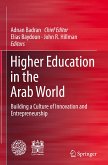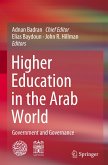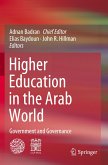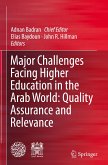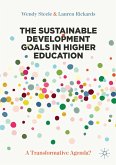Higher Education in the Arab World: Research and Development
Herausgegeben:Badran, Adnan; Baydoun, Elias; Hillman, John R.
Higher Education in the Arab World: Research and Development
Herausgegeben:Badran, Adnan; Baydoun, Elias; Hillman, John R.
- Gebundenes Buch
- Merkliste
- Auf die Merkliste
- Bewerten Bewerten
- Teilen
- Produkt teilen
- Produkterinnerung
- Produkterinnerung
Countries aspiring to participate fully in the global knowledge economy require high-quality education and research that leads to innovation, entrepreneurship and development. In spite of the large number of institutions higher education institutions, the Arab World failed to capitalise in research and development. This book will examine the current position of university research and development in the Arab region, note the main themes, their international impact, and propose new directions. Crucially, it will examine the underlying reasons for the underperformance, including specific…mehr
Andere Kunden interessierten sich auch für
![Higher Education in the Arab World: Research and Development Higher Education in the Arab World: Research and Development]() Higher Education in the Arab World: Research and Development104,99 €
Higher Education in the Arab World: Research and Development104,99 €![Higher Education in the Arab World Higher Education in the Arab World]() Higher Education in the Arab World67,99 €
Higher Education in the Arab World67,99 €![Higher Education in the Arab World Higher Education in the Arab World]() Higher Education in the Arab World75,99 €
Higher Education in the Arab World75,99 €![Higher Education in the Arab World Higher Education in the Arab World]() Higher Education in the Arab World104,99 €
Higher Education in the Arab World104,99 €![Higher Education in the Arab World Higher Education in the Arab World]() Higher Education in the Arab World104,99 €
Higher Education in the Arab World104,99 €![Major Challenges Facing Higher Education in the Arab World: Quality Assurance and Relevance Major Challenges Facing Higher Education in the Arab World: Quality Assurance and Relevance]() Major Challenges Facing Higher Education in the Arab World: Quality Assurance and Relevance75,99 €
Major Challenges Facing Higher Education in the Arab World: Quality Assurance and Relevance75,99 €![The Sustainable Development Goals in Higher Education The Sustainable Development Goals in Higher Education]() Wendy SteeleThe Sustainable Development Goals in Higher Education23,99 €
Wendy SteeleThe Sustainable Development Goals in Higher Education23,99 €-
-
-
Countries aspiring to participate fully in the global knowledge economy require high-quality education and research that leads to innovation, entrepreneurship and development. In spite of the large number of institutions higher education institutions, the Arab World failed to capitalise in research and development. This book will examine the current position of university research and development in the Arab region, note the main themes, their international impact, and propose new directions. Crucially, it will examine the underlying reasons for the underperformance, including specific government research policies, university-appointment and governance processes to stimulate research, funding assessment and allocation processes, resource limitations, and public attitudes. By substantially upgrading the research component of Arab universities along with the quality of education generally, the Arab world will have the vehicle to transition into peaceful, stable, and members of leadingglobal economies. There are opportunities for inter-university cooperation and the establishment of regional university-linked research institutes with specialist facilities.
Produktdetails
- Produktdetails
- Verlag: Springer / Springer International Publishing / Springer, Berlin / University of Petra, Amman, Jordan
- Artikelnr. des Verlages: 978-3-030-80121-2
- 1st edition 2022
- Seitenzahl: 340
- Erscheinungstermin: 4. Februar 2022
- Englisch
- Abmessung: 241mm x 160mm x 23mm
- Gewicht: 738g
- ISBN-13: 9783030801212
- ISBN-10: 3030801217
- Artikelnr.: 61973280
- Herstellerkennzeichnung Die Herstellerinformationen sind derzeit nicht verfügbar.
- Verlag: Springer / Springer International Publishing / Springer, Berlin / University of Petra, Amman, Jordan
- Artikelnr. des Verlages: 978-3-030-80121-2
- 1st edition 2022
- Seitenzahl: 340
- Erscheinungstermin: 4. Februar 2022
- Englisch
- Abmessung: 241mm x 160mm x 23mm
- Gewicht: 738g
- ISBN-13: 9783030801212
- ISBN-10: 3030801217
- Artikelnr.: 61973280
- Herstellerkennzeichnung Die Herstellerinformationen sind derzeit nicht verfügbar.
Professor Adnan Badran is the Chancellor of the University of Petra and the Chairman of the Board of Trustees of the University of Jordan. He is a biologist with over 120 publications, including 22 books and 4 patents. He was awarded an Honorary Doctorate from Sungkyunkwan University, Seoul (1981); an Honorary Doctorate in Science from Michigan State University, (2007); an Honorary Doctorate in Business from Yarmouk University, Jordan (2014); the West Watkins distinguished Lectureship Award (2009) USA; the Hall of Fame Alumni Award from Oklahoma State University, USA; and the Honorary Professorship from L.N. Gumilev Eurasian National University Kazakhstan (2012). Also, he was awarded the Arab Thought Foundation for best Arab scientist in higher education research (2005); the TWAS Regional Prize for "Building Scientific Institutions" (2009); the World Education Asia award for Outstanding Contribution to Education (2011) and the Shoman award for Peer review of young Arab scientists. Badran was Prime Minister (2005), Minister of Agriculture (1989) and Minister of Education (1989) in Jordan. He was Senator and Chair of the Senate Committee on Science, Education and Culture (2006-2010). He also served as Deputy Director-General of UNESCO (1994-1998) and Assistant Director General, Paris (1990-1994). Founding President of Yarmouk University and Jordan University of Science and Technology (1976-1986), President of Philadelphia University (1998-2005) and President of University of Petra (2007-2014), and Dean of the Faculty of Sciences at the University of Jordan (1971-1976). Secretary General (1986-1987) and Vice-president (2014- ) of the Higher Council for Science and Technology, Jordan. President of the National Centre of Human Rights, Jordan (2008-2011) and President of the Asia-Pacific Forum on Human Rights, Sidney (2009-2011). Member of the Board of Trustees of the Arab Thought Forum (2012- ). He is a Fellow and former Vice-president of the Academy of Sciences for the Developing World (TWAS), Fellow of the Islamic World Academy of Sciences (IAS) and President of the Arab Academy of Sciences. Chairman of the Board of the Arab Forum for Environment and Development in Beirut (2008- ). President of the Higher Council of the National Centre for Curriculum development (2017-2019) and Chairman of Shoman Trust Fund for Research (2019- ). Badran received his B.Sc from Oklahoma State University (1959), and Master then PhD from Michigan State University (1963), USA. Professor Elias Baydoun was educated at the University of Jordan, Amman (BS 1971), the American University of Beirut (AUB; MS 1977), and the University of Cambridge where he obtained his MPhil in 1978 and PhD in 1980. He is currently Professor of Biology at AUB, Secretary General of the Arab Academy of Sciences and Adjunct Professor at the University of Petra in Jordan. Previous positions included: Chairman of Biology (1978-93) and Associate Professor at AUB; Associate Professor, Assistant President (1983-86), Director of Planning and Development (1985-1986), and Director of Personnel (1985-1986) at Yarmouk University, Jordan. His awards include: Federation of Arab Scientific Research Councils Award, Abdul Hamid Shoman Prize for Young Arab Scientists for Biology, AUB Research Award in Natural Sciences (twice), Distinguished Scholar Award of the Arab Fund for Economic and Social Development, Developing World Study Award of the Royal Society UK and TWAS-ARO Regional Prize for Public Understanding and Popularization of Science. He is Fellow of several learned societies including the Institute of Biology, London, TWAS, Islamic World Academy of Sciences and the Arab Academy of Sciences. He organized and chaired 21 international conferences on topics related to the development of the Arab Middle East Region. His research interests include membrane and carbohydrate biology, biotransformation, nanotechnology,and medicinal plants. Professor Baydoun supervised and served on the committees of 60 PhD and MS students. He has published over 100 articles in international refereed journals and over 120 abstracts and papers in the proceedings of international conferences, as well as authoring several biology textbooks for secondary schools and community colleges. He is the first inventor of a patent on treatment of protozoal diseases (US Patent 9,173,888). He translated into Arabic a university textbook in biochemistry and was the General Coordinator of the four volumes of the Arabic Encyclopaedia on Knowledge for Sustainable Development published by UNESCO. He is the editor of four books published by Springer; one on "Water, Energy and Food Sustainability in the Middle East - The Sustainability Triangle" and three on Higher Education in the Arab World. He is a member of the Editorial Board of Scientific Reports, a journal from Nature Publishing Group anf other journals. He served as consultant for several local, regional, and international organizations including UNESCO and UNEP. Professor John Hillman, Director and Chief Executive of the Scottish Crop Research Institute (SCRI) during 1986-2005, oversaw the incorporation of the Scottish Agricultural Statistics Service (later retitled Biomathematics and Statistics Scotland - BioSS), staff transfers from the Macaulay Institute for Soil Research, links with the University of Dundee, establishment of Mylnefield Research Services Ltd, new buildings, expansion of staff numbers, and major revision of the research portfolio. Prior to his appointment at SCRI, he was Professor and Head of the Department of Botany, University of Glasgow. In the period 1995-1997, he was Chairman of the UK Technology Foresight Sector Panel on Agriculture, Natural Resources and Environment and then the Agriculture, Horticulture and Forestry Sector Panel. During 2000-2005, he was a member of the Board of Directors of the BioIndustry Association and chairman of its Industrial Biotechnology Group. Other positions held include President of the Agriculture and Food Section of the British Association; member of Court of the University of Abertay Dundee; visiting professorships in the Universities of Dundee, Edinburgh, and Strathclyde; editor and referee for several scientific journals; various committees of the Royal Society of Edinburgh; and member of the Scottish Funding Council Research and Knowledge Transfer Committee. He is scientific advisor to various organisations including the Arab Academy of Sciences.
An Overview of Research and Development in Academia.- Ups and Downs of STI Indicators in Arab Countries.- Reflections on research.- Research in the 21st Century: Towards a new Paradigm.- Role of Arab Universities in Technological Development and Innovation in the Arab World.- Bolstering Economic Growth in the Arab Region through Commercialization of Research Outcomes.- Assessing the social impact of scientific research in/on the Arab World.- Research Possibilities in Computational Modeling as a Low Cost Alternative to Traditional Experimental Research.- Innovation and Scientific Research at Jordanian Universities: The University of Petra as a Case Study.- Research Policy in Morocco and the Impact on National Development.- Research and Development from the Perspective of Oman and Sohar University.- Research, Development, and Local Impact: A Case Study of the Australian College of Kuwait.- Three Decades and beyond of Strategic Planning for Research and Development in Kuwait: Toward Achieving S&T Vision 2035.- The Challenges and Opportunities of Interdisciplinary & Transdisciplinary Research: A Case Study from the University of Sharjah.- Managing Creativity on a Budget: The Future of Academic Research and Development in Lebanon.- Contemporary Challenges Confronting Scientific Research in the Humanities in the Institutions of Higher Education in the Arab World.- Academic Research in Support of Post-Conflict Recovery in Syria.
An Overview of Research and Development in Academia.- Ups and Downs of STI Indicators in Arab Countries.- Reflections on research.- Research in the 21st Century: Towards a new Paradigm.- Role of Arab Universities in Technological Development and Innovation in the Arab World.- Bolstering Economic Growth in the Arab Region through Commercialization of Research Outcomes.- Assessing the social impact of scientific research in/on the Arab World.- Research Possibilities in Computational Modeling as a Low Cost Alternative to Traditional Experimental Research.- Innovation and Scientific Research at Jordanian Universities: The University of Petra as a Case Study.- Research Policy in Morocco and the Impact on National Development.- Research and Development from the Perspective of Oman and Sohar University.- Research, Development, and Local Impact: A Case Study of the Australian College of Kuwait.- Three Decades and beyond of Strategic Planning for Research and Development in Kuwait: Toward Achieving S&T Vision 2035.- The Challenges and Opportunities of Interdisciplinary & Transdisciplinary Research: A Case Study from the University of Sharjah.- Managing Creativity on a Budget: The Future of Academic Research and Development in Lebanon.- Contemporary Challenges Confronting Scientific Research in the Humanities in the Institutions of Higher Education in the Arab World.- Academic Research in Support of Post-Conflict Recovery in Syria.

